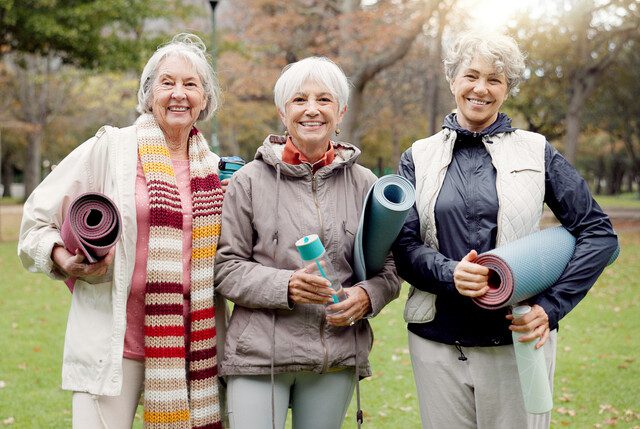The CDC estimates that between nine million and 41 million people in the United States suffer from the flu each year. Adults 65 and older are especially vulnerable to these illnesses due to weakened immune systems and underlying health issues. Luckily, as the seasons change and cold and flu season arrives, there are some easy steps seniors can take to stay healthy.
Read on to discover tips for warding off this seasonal sickness, and learn how Friendship Village of South Hills prioritizes the health and wellness of residents.
When is the Cold & Flu Season?
Cold and flu season in the U.S. typically begins in October, and can last as late as May depending on the year. However, the peak of the season occurs December through February. Though some correlate this spike with the colder weather, the more likely reasons it takes place during winter months are:
- People are spending more time indoors in close quarters.
- Lower levels of sunlight and vitamin D weaken the immune system.
- The influenza virus that causes the flu may survive better in cold and dry environments.
What are the Differences Between a Cold & the Flu?
Colds and the flu have many similarities. They’re both spread by droplets put into the air when an infected person talks, coughs or sneezes, or by touching a surface with germs and then touching your nose, eyes or mouth. The symptoms are also very similar, and include things like cough, sore throat, runny nose and fatigue.
The key difference between colds and the flu is the type of virus causing the illness. The most common source of colds are rhinoviruses, while the flu is caused by the influenza virus. Unfortunately the influenza virus tends to have more serious, longer-lasting symptoms such as high fever, body aches and chills.
What Other Respiratory Viruses Spread During Cold & Flu Season?
While cold and flu are common culprits of sickness during the winter months, there are other viruses that you should be aware of. The most notable is COVID-19, which shares many symptoms with cold and flu, but comes with a much higher risk of hospitalization or death in older adults. If cold or flu symptoms linger, they can also lead to dangerous conditions such as bronchitis and pneumonia.
4 Ways to Protect Yourself During Cold & Flu Season
No one wants to get sick. Fortunately, there are simple ways to protect yourself during cold and flu season. Use these tips to reduce your chances of ending up under the weather.
Get a Flu Shot
One of the easiest ways to prevent the flu and its more serious symptoms is to get a flu shot in the early fall. This exposes your body to a weakened version of the virus and allows your immune system to create antibodies that help fight the infection. Flu shots are readily available at doctors offices and pharmacies, and are usually fully covered by insurance or Medicare.
Because older adults are at a higher risk of complications from the flu, your doctor may recommend a high-dose flu shot. These are usually given to people 65 and older because they contain four times as much flu virus antigen, which stimulates a stronger immune system response.
Avoid Crowded Spaces
During the peak of cold and flu season, avoid crowded and confined spaces as much as possible. This could include everything from traveling through airports to attending a packed holiday party. If you’re concerned about feeling isolated, don’t skip gathering with friends. Just make sure that if anyone is feeling sick that they stay home or reschedule the event for a later time. This is just good manners!
Slow the Spread
Basic hygiene is a powerful weapon in stopping cold and flu infections. After touching surfaces in public spaces such as elevator buttons or handrails, wash your hands carefully with soap and water. You should also limit touching your nose, eyes or mouth. When in crowds, consider wearing a face mask to reduce the risk of breathing in airborne germs.
Rest and Hydrate
Give yourself the strength to fight off colds and the flu by getting plenty of rest and staying hydrated. The National Institute on Aging recommends older adults get seven to nine hours of sleep each night. Additionally, older adults are more prone to dehydration, so make it a point to build regular hydration breaks into your daily routine to keep your body healthy.
Explore Wellness Resources at Friendship Village of South Hills
At Friendship Village of South Hills, the health of our residents always comes first. Whether that’s through healthy meals at our superlative dining venues or a custom wellness plan, our dedicated team is committed to helping every individual live their best life and get the most out of each day.
If you’d like to learn more about the community at Friendship Village of South Hills or the numerous skilled health services available, please don’t hesitate to contact us today.


